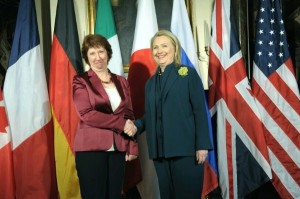
Secretary Clinton welcomes European Union envoy Catherine Ashton to the G8 Foreign Ministers meeting at the Blair House.
Media reports indicate that the sanctions imposed on Iran by the international community are taking a toll.
Sanctions, as well as domestic concerns about the government’s economic policies, are the leading causes of a 40 percent drop in the value of Iran’s currency. The currency crisis has led to protests in Tehran, quelled today by Iran’s riot police.
It is still unclear what the consequences of domestic unrest in Iran will be fleeting or something more profound. But one thing is certain: international sanctions seem to be having an effect on Iran’s economy.
The implication for the Iran nuclear standoff is that the window for a non-military solution is still open. Of course, sanctions by themselves are unlikely to convince the Iranian regime to come clean on its nuclear activities. That’s why backing up sanctions with diplomatic efforts and military preparedness is crucial.
Continuing negotiations, while maintaining economic pressure, would be ideal to achieve our strategic goal: preventing Iran from acquiring nuclear weapons.
Much depends on whether the Iranian regime will respond to this window of opportunity. The international community has clearly stated that Iran must end the secrecy surrounding its past and present nuclear activities.
Iran could start to by allowing IAEA inspectors into Parchin. This confidence-building move would go a long way towards reducing the current level of tensions. Another step would be to halt the production of 20 percent enriched uranium, most of which is not needed for a civilian nuclear program. Iran has shown some willingness to halt 20 percent enrichment, but follow-though has been lacking.
The Western approach must employ carrots as well as sticks. If Iran takes steps to address ongoing concerns over its nuclear program, the international community must be willing to offer something in return for concrete measures by Teheran, possibly easing some of the sanctions.
By imposing tough sanctions, the international community has created an incentive for Iran to resolve the questions about its nuclear program. This is an opportunity to break the nuclear stalemate.
Let’s hope Tehran takes this opportunity.


